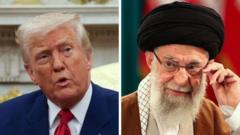Oman's foreign minister announced the rescheduling of the Iran-US nuclear talks that were set to take place in Rome, as tensions rise following recent US sanctions and threats of military action. While both nations seek to avoid conflict, doubts over the negotiations' effectiveness grow in Tehran.
Iran-US Nuclear Talks Encounter Delay Amid Rising Tensions

Iran-US Nuclear Talks Encounter Delay Amid Rising Tensions
The highly anticipated fourth round of nuclear talks between Iran and the US has been postponed due to logistical issues, with both sides navigating a complex political landscape.
A fourth round of Iran-US nuclear talks has faced delay, as stated by Oman's foreign minister who cited logistical challenges for postponing the meeting originally scheduled for Saturday in Rome. A new date is to be determined once all parties reach an agreement. This announcement follows US Secretary of Defense Pete Hegseth's stern warning on Thursday, declaring that Iran would “pay the consequence” for its backing of Yemen's Houthi rebels. Additionally, the US has placed sanctions on companies reportedly connected to Tehran.
The backdrop to these discussions involves President Donald Trump's controversial decision to withdraw from a nuclear agreement with Iran and five other nations in 2018, advocating for what he describes as a "better" deal. Trump has signaled the potential for military action if negotiations do not yield positive results, but both Iran and the US aim to prevent escalated conflict.
Iran's foreign ministry confirmed the postponement; however, the US has not issued an official statement on participation. A US source indicated that Washington never acknowledged its involvement in the fourth round, nor confirmed the timeline. Despite the setback, analysts believe the talks have not collapsed, as both sides reportedly prefer dialogue over warfare.
Nevertheless, Iranian sentiment appears to be shifting, with skepticism surrounding the negotiations stemming from the imposition of new sanctions and what Iranian officials perceive as shifting stances from the US. As part of Trump’s "maximum pressure" approach, sanctions aimed at weakening Iran's revenue channels for its regional activities were announced recently, emphasizing the US's position on Iran's nuclear ambitions and its influence in Middle Eastern conflicts.
While Trump seeks to negotiate an agreement that would minimize Iran's capacity to build nuclear weapons, there are factions within his administration advocating for the total dismantlement of Iran’s nuclear program. Iran, on its part, contends that its nuclear endeavors are peaceful and wishes to reach an agreement in exchange for easing sanctions while maintaining some level of nuclear enrichment capability.
Iran remains the target of extensive sanctions internationally, placing constraints on its economy as President Massoud Pezeshkian focuses Iran's policy on the expectation of sanctions relief through negotiations. With the political landscape continually evolving, the forthcoming rescheduling of talks will be closely monitored.




















